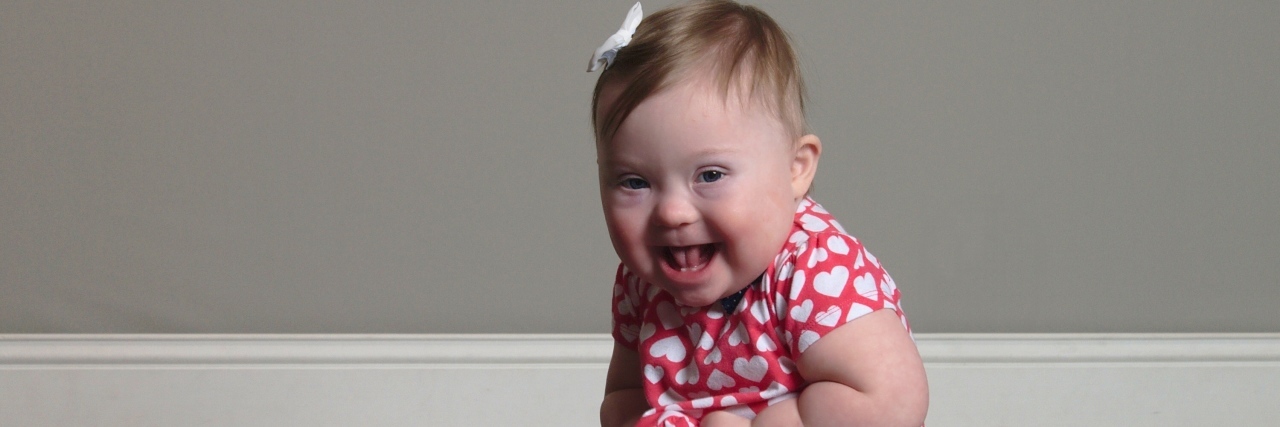Before Hannah was born, I didn’t know anyone with Down syndrome. In fact, I’m not sure I had ever even spoken to someone with Down syndrome. Finding out your child has any genetic difference is scary, and not knowing anyone with the same difference makes it even more scary. I had absolutely no idea what to expect.
Knowing only what the geneticist told us, along with everything I read online, led to a lot of misconceptions about Down syndrome. The biggest misconception I had though, was that having a child with Down syndrome was going to negatively, and drastically change our lives.
We actually had an overall, very good diagnosis delivery. Our geneticist presented the facts of what Down syndrome was genetically, and some of the delays and health conditions children with Down syndrome generally have. She presented it mostly in a positive light, but hearing all of the things Hannah could struggle with in her life, was still hard. We were given the book “Babies with Down Syndrome: A New Parent’s Guide,” by our local Down Syndrome Association, as well as some pamphlets by the geneticist.
Being the type A person I am, I immediately started reading all of them. I remember reading the booklet the hospital gave us and crying. Even when presented in a positive light, everything was still so negative. All it talked about were the health problems and delays children with Down syndrome tend to have. Then I started reading the book, and that made matters even worse. Every single health problem any child with Down syndrome had ever been diagnosed with seemed to be in that book. After reading just the first several pages, I was even more terrified. I thought my daughter was going to be a blind, deaf, gluten intolerant, mute, heart baby from birth.
I don’t think there is anything inherently wrong with presenting the possibility of a child having certain health conditions, but when it’s not balanced with all the positives of Down syndrome, it ends up simply creating fear. I thought my life was going to revolve around Down syndrome. I thought it was going to be all I thought about. I thought it was going to consume every aspect of my being, but it doesn’t.
I forget Hannah has Down syndrome most of the time. Yes, I’m very involved in the Down syndrome community, but when I look at Hannah, I don’t see Down syndrome. Do I think sometimes about how she has a higher likelihood of having her memories stolen from her by Alzheimer’s? Yes. Do I worry she has leukemia when I see pin prick red dots on her? Sometimes, yes. But I don’t spend all of my time thinking about how my daughter has Down syndrome.
I spend my time thinking about how she has her daddy’s eyes and hair. I spend my time thinking about how she’s getting so big so quickly. I spend my time thinking about how much joy she brings us. I can confidently say, there is not one area of our lives that has been negatively impacted by Hannah having Down syndrome. The only drastic changes I can think of are positive ones. I am a kinder, more compassionate, more patient person since having Hannah, and I now have the opportunity to be a part of a community filled with amazing people. I wish the pamphlets hospitals give would mention that those changes might occur.
I wish they would say that while almost 50 percent of babies with Down syndrome are born with heart defects, you will be a stronger person because of it.
I wish they would say that your baby with Down syndrome may have hypotonia and have delayed gross motor skills, but you will learn to celebrate small victories in ways other parents can’t.
I wish they would say there will be challenges with raising a child with Down syndrome, but there are challenges with every child, and they will bring you more joy than you have ever known.
I can’t help but think that if the pamphlets had spent less time talking about the negatives, and more time talking about how amazing being the parent of a child with Down syndrome would be, that I wouldn’t have been half as terrified, and perhaps other parents who are considering termination wouldn’t be either.
Hannah has spent the past year shattering all of my misconceptions about Down syndrome. She has spent the past year defining herself as a warrior who spreads joy wherever she goes, instead of as just a baby who has Down syndrome. Maybe if we continue to strive to define people with Down syndrome by who they actually are, instead of by their diagnosis, we can finally see the misconceptions about Down syndrome come to an end.

